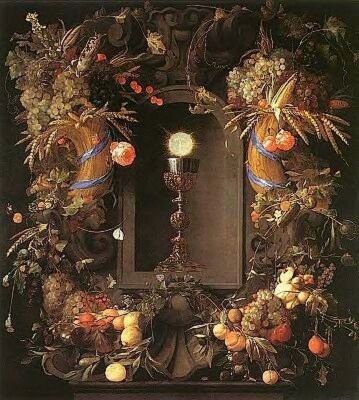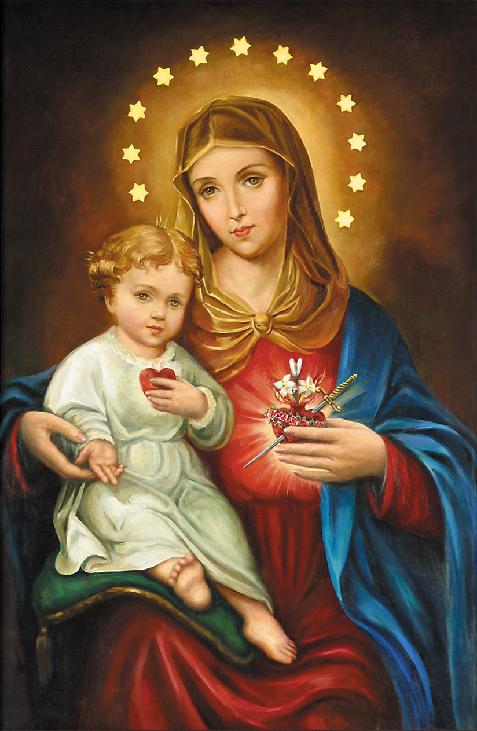O Lord, I am not worthy
That Thou should'st come to me,
But speak the words of comfort,
My spirit healed shall be.
O, come, all you who labor
In sorrow and in pain,
Come, eat This Bread from heaven;
Thy peace and strength regain.
O Jesus, we adore Thee,
Our Victim and our Priest,
Whose precious Blood and Body
Become our sacred Feast.
O Sacrament most holy,
O Sacrament divine!
All praise and all thanksgiving
Be ev'ry moment Thine.
The Latin Church celebrates this venerable Feast in honour of Our Blessed Lord in the Most Holy Eucharist on the Thursday after Trinity Sunday. We profess that He is truly present, Body, Blood, Soul and Divinity, in the Most Blessed Sacrament.
Protestants deny Our Lord's omnipotence when they refuse to believe that He is truly present in the Consecrated Species. This heresy is not new, and more certainly, it is not unique to these heretics - this same truth had been denied by the faithless Jews during the time of Our Lord Jesus Christ. When Our Lord did proclaim Himself to be the Bread of Life that came down from Heaven, the unbelieving Jews scoffed at Him.
The Jews therefore murmured at him, because he had said: I am the living bread which came down from heaven. And they said: Is not this Jesus, the son of Joseph, whose father and mother we know? How then saith he, I came down from heaven?St John 6:41, 42
Our Divine Lord continued:
Then Jesus said to them: Amen, amen I say unto you: Except you eat the flesh of the Son of man, and drink his blood, you shall not have life in you. He that eateth my flesh, and drinketh my blood, hath everlasting life: and I will raise him up in the last day. For my flesh is meat indeed: and my blood is drink indeed. He that eateth my flesh, and drinketh my blood, abideth in me, and I in him. As the living Father hath sent me, and I live by the Father; so he that eateth me, the same also shall live by me.St John 6:54-58
It is also important to note that when Our Lord expounded on teachings of particular importance, He would begin by saying, 'Amen, amen, I say unto you.' It calls for special emphasis on the truths He was to expound. In His short public ministry of three years, His Mission is to teach as much as possible and expound the truths most necessary for salvation. When using parables or metaphors, Our Divine Lord would have stated it so clearly and explicitly that it is impossible for anyone to think otherwise. He is God, He is Almighty - He is not the fuzzy-wuzzy street-preacher you would expect standing at the corner of Orchard Road.
If any one shall say that, in the most holy sacrament of the Eucharist, there remains the substance of bread and wine together with the body and blood of our Lord Jesus Christ; and shall deny that wonderful and singular conversion of the whole substance of the bread into the body, and of the whole substance of the wine into the blood, the species of bread and wine alone remaining, which conversion the Catholic Church most fittingly calls Transubstantiation, let him be anathema.Council of Trent - Session 13, Canon 2





.jpg)
No comments:
Post a Comment